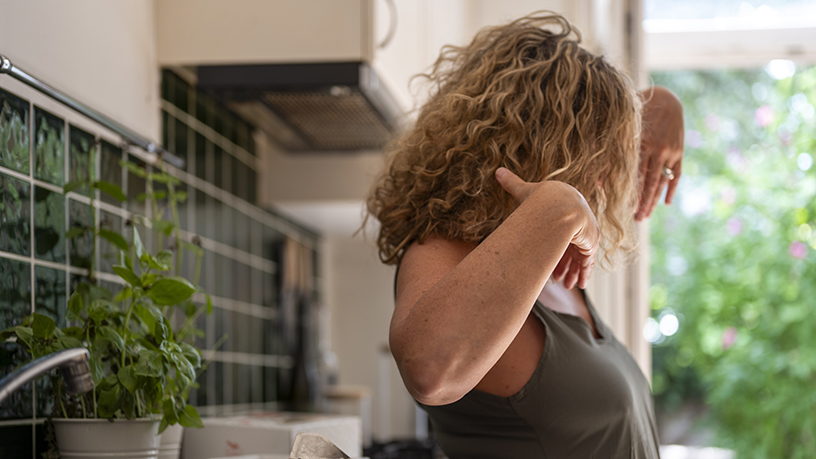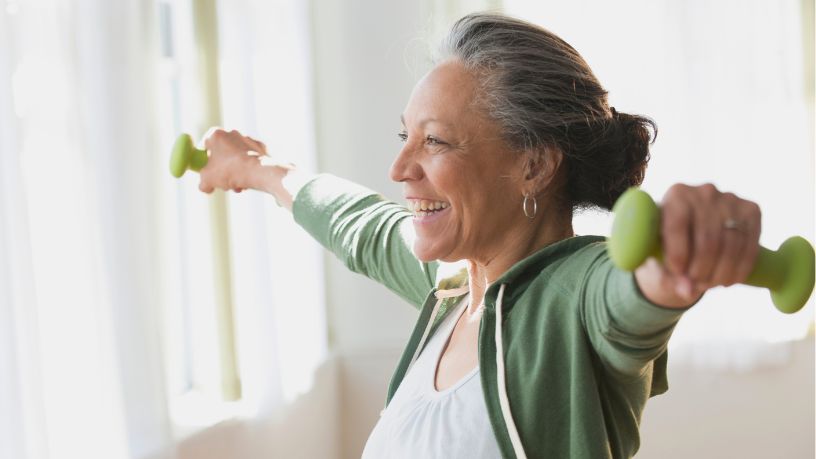On this page
Key takeaways
- Menopause causes biological changes that can affect your emotions.
- Changes in hormone levels can cause symptoms of depression, fatigue and anxiety.
- When our bodies change, this can impact relationships, self-esteem and confidence.
Hot flushes, night sweats, brain fog and changes in weight are all common symptoms of menopause. On top of physical changes, more than 60% of Australian women report experiencing psychological symptoms associated with perimenopause and menopause.3
Understanding the causes of these changes and how to treat them may make it easier to manage.
What causes menopause symptoms?
Most of the physical and psychological symptoms of menopause1 are triggered by a change in hormones in the body, says Bupa GP, Dr Janice Tan.
“From perimenopause, there is a sudden drop and fluctuation of hormones that cause physical changes to the body but can also affect how women feel.”
The primary hormonal change is a drop in oestrogen, which has a major role in female reproductive function, including puberty and the menstrual cycle.
Oestrogen also plays a role in bone and heart health, as well as brain function and energy levels.
The biological and emotional symptoms of menopause
While many of the common physical symptoms associated with menopause, such as changes in weight, insomnia, hot flushes and night sweats, are physical, they can have a direct impact on how women feel.
“Changes during menopause aren’t just biological, they are psychological and social as well,” says Dr Tan. “More than half of the women I see in my practice who come in with questions about menopause are experiencing mental as well as physical symptoms.”
While Dr Tan is quick to stress that all these changes are normal, she admits they aren’t always easy to navigate.
“A loss in libido for example, while a physical symptom, might have a big impact on a relationship. Being unable to sleep due to night sweats is physical, but the fatigue and irritability the next day, maybe at work or with the kids, can feel like an emotional problem.”
When a woman’s body changes due to menopause it can impact how people treat her and how she feels in the world. It's all connected.
Treatment for menopausal symptoms
While mental health symptoms relating to menopause may be common, they aren’t always easy to live with2, says Dr Tan.
“If you start to have persistent feelings of sadness or anxiety that start to affect your work and relationships, or if you start to withdraw from things you used to enjoy socially, it could be time to seek help.”
Dr Tan recommends talking to your GP or women’s health practitioner about your symptoms.
It's not a one-size-fits-all treatment approach. Deciding how best to treat menopause symptoms comes down to the person’s values and goals, what really matters to them.
Medication
Medication is one treatment option that may help with both the physical and emotional symptoms of menopause.
“Traditional hormonal treatments, such as HRT [also called menopause hormone therapy], are popular for physical symptoms,” says Dr Tan. “But some of the non-hormonal treatments for hot flushes are actually a type of antidepressant known as an SNRI. That type of approach could work well if you are experiencing both depressive symptoms and hot flushes as a result of menopause.”
Get chemist delivery
Bupa health insurance members can have prescriptions filled by local chemists and get them delivered to their door by registered couriers. You can also order over-the-counter goods. Delivery address must be within 8km of a participating pharmacy.
Lifestyle changes
Dr Tan is quick to point out that medication may not be the right fit for everyone.
“Medication isn’t always enough and can be just one part of other treatments that can help to ease symptoms.”
Staying physically active, maintaining a healthy, balanced diet and connecting with friends and loved ones have all been shown to help elevate and regulate mood.
Practising daily mindfulness, whether it’s a yoga class, a walk in the fresh air or journalling, can also help ease symptoms of anxiety and stress.
Talking therapy
If feelings of low mood or anxiety persist, it might be helpful to see a psychologist or counsellor.
Mental healthcare practitioners can provide a safe space in which to talk about your feelings and help you to develop some coping strategies that can help to ease symptoms. Ask your GP for more information about how to connect with the right person.
Free online mental health program

At Bupa, trust is everything
Our health and wellbeing information is regularly reviewed and maintained by a team of healthcare experts, to ensure its relevancy and accuracy. Everyone's health journey is unique and health outcomes vary from person to person.
This content is not a replacement for personalised and specific medical, healthcare, or other professional advice. If you have concerns about your health, see your doctor or other health professional.
1Health Direct. (2024). Oestrogen.
2Jean Hailes. (2025). How to manage menopausal symptoms.
3Panay N.,Palacios S.,Davison S.,Baber R. (2021) Women’s perception of the menopause transition: a multinational, prospective, community-based survey. Gynecological and Reproductive Endocrinology & Metabolism.
You might also like
Staying healthy during menopause
Eating well and staying active can help to support your well-being during the menopause rollercoaster.
The lowdown on menopausal hormone therapy (MHT)
A closer look at menopausal hormone therapy and how it can help on your menopause journey.
Menopause: What it is and how to manage symptoms
What you need to know about menopause and how to manage the menopause journey.
The importance of strength training for women’s health
Strength training is essential for staying fit and mobile as you age, building stronger bones and improving your overall wellbeing.





